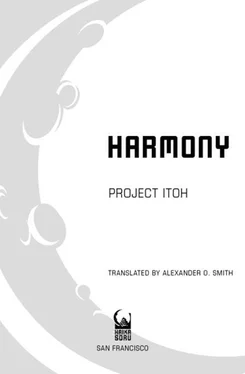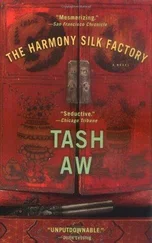Itoh, Project - Harmony
Здесь есть возможность читать онлайн «Itoh, Project - Harmony» весь текст электронной книги совершенно бесплатно (целиком полную версию без сокращений). В некоторых случаях можно слушать аудио, скачать через торрент в формате fb2 и присутствует краткое содержание. Год выпуска: 2010, Издательство: Haikasoru/VIZ Media, Жанр: Старинная литература, на английском языке. Описание произведения, (предисловие) а так же отзывы посетителей доступны на портале библиотеки ЛибКат.
- Название:Harmony
- Автор:
- Издательство:Haikasoru/VIZ Media
- Жанр:
- Год:2010
- ISBN:нет данных
- Рейтинг книги:4.33 / 5. Голосов: 3
-
Избранное:Добавить в избранное
- Отзывы:
-
Ваша оценка:
- 80
- 1
- 2
- 3
- 4
- 5
Harmony: краткое содержание, описание и аннотация
Предлагаем к чтению аннотацию, описание, краткое содержание или предисловие (зависит от того, что написал сам автор книги «Harmony»). Если вы не нашли необходимую информацию о книге — напишите в комментариях, мы постараемся отыскать её.
Harmony — читать онлайн бесплатно полную книгу (весь текст) целиком
Ниже представлен текст книги, разбитый по страницам. Система сохранения места последней прочитанной страницы, позволяет с удобством читать онлайн бесплатно книгу «Harmony», без необходимости каждый раз заново искать на чём Вы остановились. Поставьте закладку, и сможете в любой момент перейти на страницу, на которой закончили чтение.
Интервал:
Закладка:
“I’m sorry if I startled you. It was unintentional. I’m here to ask after a particular person and about certain neurological research. I have reason to believe you can help me on both points.”
“By all means.”
“First, the research. Are you familiar with a paper that lays out, in great detail, the feedback mechanisms in the midbrain?”
“Yelensky’s paper?”
“That’s the one,” I said, watching her face closely.
She moved her lips like she was rolling a candy around in her mouth, staring at me a moment before she said, “This is an inspection, then.”
I waved both hands in denial. “No, it’s not, really. All I’m asking for is information that we think can help with an ongoing investigation. Why do you think this is an inspection?”
“Because our neuromedical consortium is putting together a model of those very mechanisms you speak of.”
“Then, do you think you could explain the general gist of your research to me—just whatever’s been publicly announced.
I don’t mean to pry,” I said as gently as I could.
Étaín thought for several seconds before telling me that the consortium was researching the nature of value judgments within the human psyche.
“What sort of judgments?” I asked.
“Say, for instance, if I offered someone ten thousand credits now or a promise for twenty thousand credits a year from now, which would they choose?”
“The former, probably.”
“Indeed. And this is true not only of humans but also of primates such as chimpanzees, and birds such as pigeons and pheasants. Similar desire tendencies can be observed in other animals typically kept as pets, such as dogs and cats. This category of organisms overestimates the value of that which is right in front of it.”
“Is that something we evolved?”
“It’s part of our genetic programming. However, to find the same feature across so many varied species indicates that there is some reason this is a particularly easy feature for vertebrates to develop.”
“Well, isn’t it kind of obvious? If we don’t eat the thing sitting right in front of us, some other individual will come along and take it away. Individuals who sit around waiting for a future reward would die in such a world. Isn’t valuing the bird in hand just part of the survival of the fittest?”
“If you plot perceived value on a graph, with the horizontal axis as time and the present as zero, then you will see the line representing value curve sharply upward the closer it comes to the zero point, reaching its zenith as it hits the vertical axis. By comparison, value in the far future goes low quickly, changing hardly at all between a year and two years distant. A hyperbola. When humans and most living creatures consider the value of something, they tend to see its future value diminish hyperbolically.”
“In other words, our system of evaluation isn’t exponentially logical, it’s hyperbolically illogical.”
“Indeed. And because we possess a hyperbolic value system, we make illogical decisions and take precipitate actions. When a chance to profit presents itself clearly before our eyes, we erroneously believe its value to be much greater than it actually is. There is an ongoing survival game between the agents of short-term desire and long-term desire, and we call this game will . This is an important feature of the feedback mechanism that Yelensky’s model of human will does not consider—a model we are currently using our findings to perfect.”
I thought of my father. If you wanted to use the feedback mechanism to control human will, you would need a very detailed model of human value judgments in order to accurately predict how such control would function.
“Dr. Nuada Kirie wouldn’t be part of the project team, would he?”
“He is, that is, he was in the beginning. He is no longer with the consortium.”
“Was Dr. Kirie using this midbrain feedback web model for any other research?”
“Well…some of our researchers do take part in side projects, but I’m afraid I wouldn’t know about any of that.”
“How does knowing that the feedback web follows a hyperbolic curve change your view of human will compared to previous models?” I asked out of plain curiosity.
Étaín put a hand to her chin in thought for a moment. “Well, I suppose the revelation that human will is actually more of a battle royal between multiple desire agents within the brain has allowed us to prove that animals too possess a will.”
“In other words, animals aren’t just acting by their genetic programming or instinct?”
“Your language reveals a bias. What we call our ‘will’ or ‘soul’ is really just a collision between multiple genetically programmed elements. There is a test using pigeons where one button releases ten beans when it’s pressed and thirty beans when it’s pressed after waiting a certain amount of time. It turns out that there are pigeons who choose to wait for the thirty beans. Pigeons have the same range of choice allowed them by will under our model. In other words, the model allows us not only to understand human will but the very nature of consciousness, and put that knowledge to better use.”
“Such as?”
“Such as…pain,” she said.
“Excuse me?”
“First, you have to understand the true nature of what I have been referring to as feedback. Any psychological effect that grabs the attention of the consciousness and leaves a strong impression is feedback. This is true under Yelensky’s model as well. The feedback need not be a reward or even anything beneficial.”
“All right. And?”
“The pain we feel the moment we prick our finger with a needle is nothing more than another agent trying to leave an impression and get selected. The hyperbolic time axis in this case is very short, making it easier for the pain to be chosen.”
I frowned. How could pain be chosen? “But you can’t accept or deny pain,” I said.
“Actually, you can. Surely you have heard stories of people who are so focused on some activity that they only realize their finger or arm has been cut off some seconds after the fact. This is because the pain competed with, yet failed to overcome, the hold that activity had on their consciousness.”
“I see.”
“That is why we understand pain to be a subjective experience. For a physical sensation, it is highly dependent on environmental factors to determine whether or not it is selected and to what degree. That is why there is no absolute scale to measure pain.”
“So all of the sensations that make up our reality are these agents who have been selected for advancement to the upper levels of the brain?”
“That’s one way to put it, yes. Even sight, sound, smell, and taste must be selected before they are permitted into the consciousness,” Étaín said. “Of course, these basic stimuli have steep hyperbolas, making it easy for them to make the final cut, so they are rarely entirely ignored.”
“Which means that, in a sense, your research isn’t just about our consciousness, but about how our very reality is constructed.”
Étaín raised an eyebrow and looked at me as though I had said something peculiar. “But reality and consciousness are the same thing, Inspector Kirie.”
“Are they?”
“The reality we can accept is limited to our consciousness, after all.”
“I suppose you’re right.”
Gabrielle Étaín stood and extended her hand. “I hope I have answered all of your questions to your satisfaction, Inspector Kirie. Now, if you don’t mind, I should get back to my work.”
I thanked her and shook her hand, saying that I might be back again. Just then, I became suddenly curious as to how this woman had taken the news of the declaration. I wondered what decision she would make.
Читать дальшеИнтервал:
Закладка:
Похожие книги на «Harmony»
Представляем Вашему вниманию похожие книги на «Harmony» списком для выбора. Мы отобрали схожую по названию и смыслу литературу в надежде предоставить читателям больше вариантов отыскать новые, интересные, ещё непрочитанные произведения.
Обсуждение, отзывы о книге «Harmony» и просто собственные мнения читателей. Оставьте ваши комментарии, напишите, что Вы думаете о произведении, его смысле или главных героях. Укажите что конкретно понравилось, а что нет, и почему Вы так считаете.












